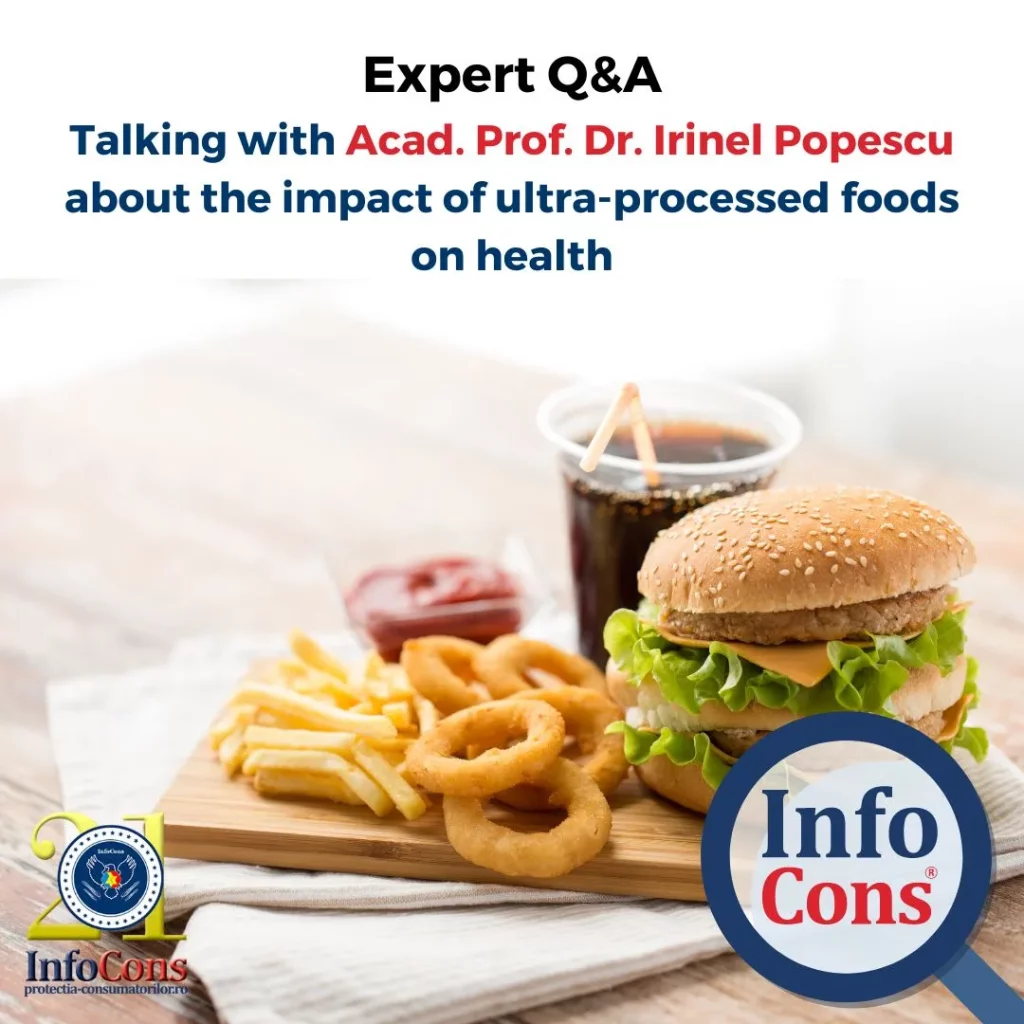
Ultra-processed foods have become a significant part of the modern diet. These foods, characterized by long shelf life, attractive packaging, and low cost, are produced through various industrial processes. Although they are accessible and extremely tasty, specialists warn that their consumption is often linked to numerous health problems.
Designed for quick preparation or consumption, ultra-processed foods are often marketed as time-saving, including ready-to-eat meals, snacks, and beverages that require minimal cooking or are already cooked.
What are ultra-processed foods ?
Ultra-processed foods are a category of food products created through industrial processes that transform raw ingredients into ready-to-eat or ready-to-heat products. Unlike minimally processed foods (e.g., washed and packaged vegetables) or even processed culinary ingredients (e.g., flour, sugar), ultra-processed foods contain ingredients and additives not commonly used or at least not in such large quantities. These foods often use ingredients synthesized in laboratories, such as artificial sweeteners, colorants, and flavors.
Do you know what Food Additives are ? You can read more HERE
These foods contain numerous additives to improve flavor, texture, color, and shelf life. Common additives include emulsifiers, preservatives, stabilizers, and anti-caking agents.
Examples of ultra-processed foods :
- Sugary drinks: soft drinks, energy drinks, and sweetened fruit juices;
- Snacks: chips, cookies, and candies;
- Instant foods: instant noodles, instant soups;
- Processed meats: hot dogs, sausages, and deli meats;
- Breakfast cereals: sweetened and flavored cereals;
- Pastry products: cakes, pastries, and long-shelf-life bread;
- Frozen products: vegetable, fish, meat-based meals, or frozen desserts.
In this interview, we invited Acad. Prof. Dr. Irinel Popescu , a doctor, corresponding member of the Romanian Academy , Section of Medical Sciences, Head of the Second Department of General Surgery and Liver Transplantation at Fundeni Clinical Institute , to answer a few questions.

*Foto source : facebook.com
1. “Ultra-processed” can mean many different things , including canned vegetables or various frozen products . Does “ultra-processed” automatically mean “bad for my health” ?
Dr. Irinel Popescu: “It doesn’t automatically mean bad because, on the one hand, we can admit that all these foods are certified to be marketed, and this certification is primarily the responsibility of Consumer Protection . They have received the green light, so to speak, to be placed on the market. From there, we ask where the toxic component begins. This starts with the quantity consumed. In small doses, the effects, even if they exist, are minimal and can be overcome, and those small quantities are not necessarily toxic. In large and repetitive doses, toxic effects can naturally appear.”
2. What are the health risks faced by people who consume ultra-processed foods ?
Dr. Irinel Popescu: “My sincere advice is to try to consume as many natural foods as possible. From there on, as we resort to these preserved foods, if they completely replace natural foods, then, surely, toxic effects will appear. There are no studies showing the exact threshold and dose, plus there is a great responsibility in making statements in this area because we need preserved foods. Today, the world cannot feed itself only with natural foods. Thus, without sufficiently clear data, all I can say is that if someone gets used to consuming only preserved foods, at some point, toxic effects will also appear.”
Read also : What Do Food Labels Reveal? Why Is It Important to Read Them Carefully?
3. What do you consider to be the biggest traps on the label of an ultra-processed product ? We can think of “clean label” or “no added sugar” .
Dr. Irinel Popescu: “All these products: salt in large quantities, which is a preservative but becomes toxic in large quantities, sugar plus other substances used as additives and preservatives, over time, accumulated, will surely have effects on health. The traps on labels can refer to the dose at which these additives become toxic and especially to the fact that some of them have this hidden addictive element among the ingredients.”
4. Should legislation be improved to better inform consumers about ultra-processed foods ? If so , how could we improve the legislation ?
Dr. Irinel Popescu: “I would lean towards the idea of education. What you are doing, at InfoCons , matters in my opinion, maybe more than changing legislation, which is not easy due to the need to feed billions of people. The planet has a significant number of people living on it, and all of these need to be fed. Therefore, we must understand the necessity of food processing. However, the more educated people are, and the more they know that when they have no choice, they will obviously consume processed foods. But when they have a choice, they can replace them with natural ones. This is more important than changing legislation. Education is paramount!”
5. Are ultra-processed foods high in salt and sugar pleasing to the brain ? Can we talk about addiction ?
Dr. Irinel Popescu: “Some products may not necessarily be toxic, but they can create addiction. There are certain ingredients that modify the taste in a favorable way and create a certain dependence of the consumer on these foods, which obviously have a degree of toxicity. I stick to my previous advice, namely, there is no diet without natural foods. If someone can afford them exclusively, it’s wonderful!”
6. Given that they are always available , tasty , and cheap , is it easier to consume them excessively without realizing it ? What does excess mean ?
Dr. Irinel Popescu: “We all know the effect of fast-food chains. Lately, most people have become more aware. But surely, over time, millions, perhaps billions, of people have consumed these foods, liked them, their taste giving addiction. The cumulative toxic effects are known. Today, people know, and they know more than before, they have learned to avoid them. As much as possible.”
7. What is the impact on children’s health if these ultra-processed foods are found in their diet from an early age ?
Dr. Irinel Popescu: “For children, it is even more serious. Because their discernment capacity is somewhat lower than that of adults, because the ease with which they become dependent on a certain type of diet is much greater than in adults. Their ability to inform themselves is lower than that of adults and especially to understand the information you provide. For children, the risks are somewhat higher, and the only solution is stricter supervision by parents.”
8. What is the impact of consuming ultra-processed foods on the health and quality of life of the elderly ?
Dr. Irinel Popescu: “You know well, the elderly pensioners, because we are talking about them, have an income level that only allows them to buy cheap products. Cheap products are often those that use processed or ultra-processed foods. It is hard for them to avoid them. Maybe the only advantage at an advanced age, if we can call it an advantage, is that food needs are much lower. And the elderly can and should consume less. This somewhat mitigates the harmful effects of ultra-processed foods.”
Read also : Pay attention to Alerts for food products with the European InfoCons App !
9. How does the consumption of ultra-processed foods that contain large amounts of salt , added sugars , and saturated fats impact health in the long term ?
Dr. Irinel Popescu: “Salt, in large quantities, has effects primarily on blood pressure. Professor Dr. Maria Dorobanțu has conducted several studies on this topic on the Romanian population, demonstrating a high salt consumption that should be much better controlled. The fact that a large percentage of the elderly suffer from hypertension, one of the causes is excessive salt consumption. Regarding sugars, obviously, type 2 diabetes is also an elderly disease. Over time, the pancreas’s ability to secrete insulin and insulin’s ability to control blood sugar decreases. Here, the risk of consuming excess sugar exacerbates this type 2 diabetes, with all its negative effects. As for saturated fats, the process of atheromatosis is increasingly accentuated with age, the risk of atheromatosis, especially in coronary and carotid vessels, with the possibility of myocardial infarction or stroke, all these conditions primarily concern the elderly. All these products combined outline the so-called metabolic process. They go hand in hand. And see, the risk increases exponentially.”
10. Which categories of ultra-processed foods have the greatest impact on health ?
Dr. Irinel Popescu: “In general, I could say ultra-processed meats because there we find both saturated fats and excess salt and preservatives and additives . And of course, ultra-concentrated sweets, likewise, are not good. But still, I would put ultra-processed meats first.”
11. How can we change bad eating habits to incorporate more foods that are beneficial for health and improve the quality of life ?
Dr. Irinel Popescu: “Through education and promoting local producers in some way. If those who bring natural products to the market or stores were encouraged in some way, then obviously it would be easier for people, and they would start to prefer these products over ultra-processed ones as they become more accessible, cheaper, and handy.”
Article written by Cosmina Nițu
Master’s degree in nutrition and diversification consultant
Translated from Romanian by Andra Nițu
Master’s degree in communication sciences
InfoCons – European Organization for Consumer Protection and Promotion of Programs and Strategies , a full member of the World Organization Consumers International , founding member of the Federation of Consumer Associations , and member of ANEC .